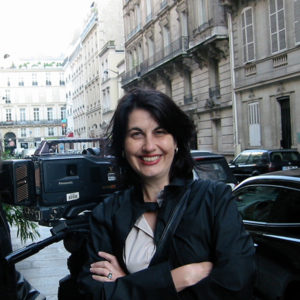Bio

Maya Gallus is an award-winning filmmaker whose most recent documentary, The Heat: A Kitchen (R)evolution, was opening night selection for the 2019 Berlinale Culinary Cinema and the 2018 Hot Docs Film Festival. Her early films, the docufiction Elizabeth Smart: On The Side of the Angels, and Erotica: A Journey into Female Sexuality, a pioneering film about women’s desire, began her ongoing exploration of “the female gaze”.
In 2003, she formed Red Queen Productions with her partner, Justine Pimlott. Their films, including Punch Like a Girl, on women’s boxing; Girl Inside, an early transgender portrait; Dish: Women, Waitressing & the Art of Service; Derby Crazy Love, on the feminist revival of roller derby, and The Mystery of Mazo de la Roche, have screened internationally and theatrically. Featured in The Guardian , Ms., Curve, Bust, Salon, The Walrus, Now Magazine and POV, their work is characterized as “stories that humanize and bring into the mainstream often-derided or marginalized experiences.”
An alumnae of the Canadian Film Centre and Women in the Director’s Chair, Gallus was honoured with a mid-career “Focus On” retrospective at the 2017 Hot Docs Film Festival.
As a writer, her work has appeared in Toronto Life, The Globe & Mail, the San Francisco Chronicle, and, most recently, POV, featuring her essay on Agnes Varda’s cinematic legacy.
Videos
Questionaire
Why did you get involved in this project?
I loved the idea of engaging in a creative exercise that could be very simple in execution to shift the energy and address the feelings that were coming up during the pandemic.
Did the one week turn-around for the work help or hinder your creativity?
It helped as there was no time to overthink it. I viewed it as the equivalent of a gesture drawing, or a sprint, something to fire the creative muscles in a different way.
How did you feel about working on a project where you didn’t know who you were collaborating with?
It was unnerving at first, not because I didn’t know who my collaborators were (I trusted Midi’s curation of that process) but because I had to let go of “control issues” as I had no idea how the material would be used. Once I let go of that, it was liberating, and an apt metaphor for how to navigate the pandemic.
Has being involved in the project changed your thoughts on creativity?
It’s served as an important reminder that creativity is not about the tools, or even, perhaps, the end result, it’s about intention, and the act of expression, small or large, in our daily lives.